What does a year look like for the UNC Lineberger Comprehensive Cancer Center?
It’s daily discoveries and cutting-edge research that bring new cancer treatments to life. Together, it’s a year of providing spectacular patient care to North Carolinians. It’s the many inspiring stories of strength, compassion and hope. And in 2019, it was so much more.
Join us as we look back at 2019. As we prepare to enter a new decade, we look forward to telling many more stories of hope and healing. We look forward to sharing the next big breakthrough in cancer research and treatment. Most importantly, we look forward to growing and continuing to serve as a beacon of cancer care and research in North Carolina and beyond.
N.C. Cancer Hospital: A decade of hope and healing

Fall 2019 marked 10 years since the opening of the North Carolina Cancer Hospital, a state-of-the-art cancer center built by the people, for the people, of North Carolina. The North Carolina Cancer Hospital is the clinical home of the UNC Lineberger.
Funded by the state of North Carolina, the cancer hospital was designed to substantially improve cancer care in North Carolina, impact the state’s economy and position the state as a national leader in cancer care and research. In its 2019-20 Best Hospitals survey, U.S. News & World Report ranked UNC as the top cancer center in NC, and 27th nationally.
Dive into the history of the N.C. Cancer Hospital and see what folks are saying about the 10 year celebration on our special anniversary website.
Roy Williams’ Fast Break Against Cancer event reaches $3 million raised
UNC-Chapel Hill Men’s Basketball Coach Roy Williams hosts the annual Fast Break Against Cancer at the Dean E. Smith Center. The fundraising event features a breakfast, keynote speaker and live and silent auctions.
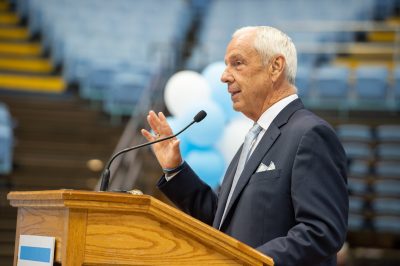
The 15th annual event reached a milestone this year of raising more than $3 million for UNC Lineberger. “I understand we love (treatment) success stories, and we have the chance to get more success stories the more money we raise,” Williams said.
This year’s keynote speaker Chad Holbrook offered a compelling reason why to support UNC Lineberger and its mission: the health of his son, Reece, who is a cancer survivor and a top prospect high school baseball player. Chad Holbrook is the head coach of the College of Charleston baseball team, a Carolina alumni, and former assistant Carolina baseball coach.
Fifteen years ago, Holbrook recalls the day his family’s world was turned upside down: “The pediatrician said those words that no parent wants to hear: ‘We’re afraid your son has leukemia; he needs to be admitted to the hospital right away.’”
Get the full story on the 2019 Roy Williams’ Fast Break Against Cancer.
Tackling cancer with CAR-T therapy
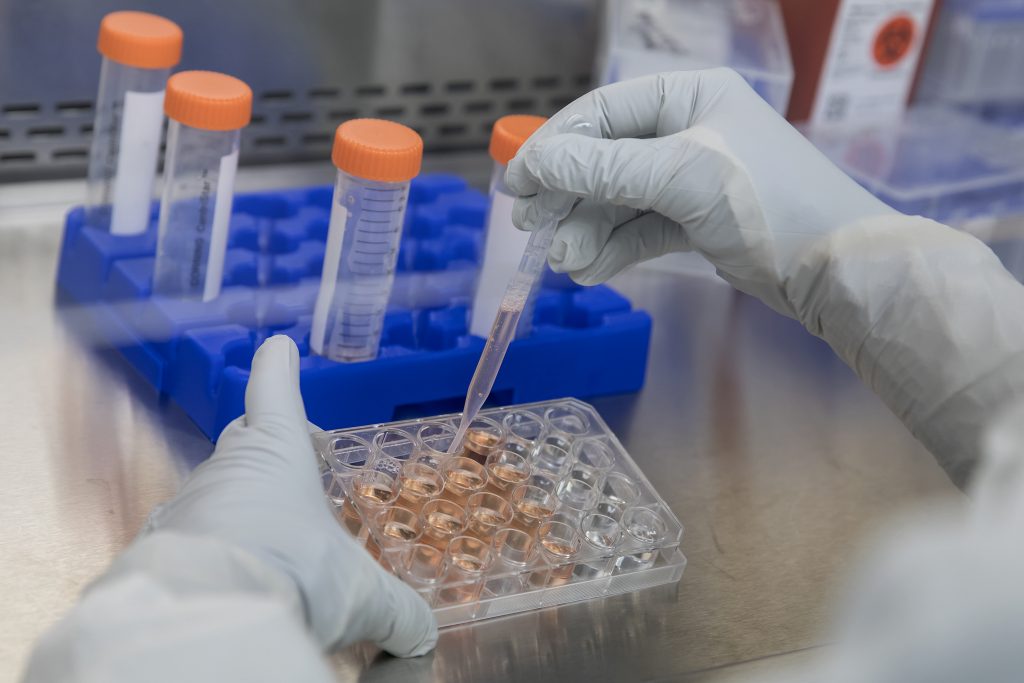
Chimeric antigen T-cell (CAR-T) immunotherapy is a novel cancer therapy. It is quickly becoming a pillar of cancer treatment alongside radiation, chemotherapy and surgery.
UNC Lineberger is designing, developing and delivering these CAR-T therapies, which is designed to treat cancers that don’t respond to standard treatments.
CAR-T is created by extracting T-cells, which are disease-fighting immune cells, from the patient’s blood. These cells are genetically engineered to recognize and direct an attack against the patient’s cancer. The cells are then infused back into the patient.
UNC Lineberger is one of only a select few academic centers in the United States with the capabilities to identify new tumor targets, and then develop and infuse novel CAR-T immunotherapy, making it possible for people who live in or near the Southeastern U.S. to stay closer to home to undergo clinical immunotherapy to treat their cancer.
In 2019, UNC Lineberger researchers launched new CAR T-cell immunotherapy clinical trials, including for multiple myeloma, and neuroblastoma in children. The cancer center now has nine adult and pediatric CAR T clinical trials open, and it also offers two commercially available CAR-T treatments.
Additionally, UNC Lineberger researchers on the cellular immunotherapy team were named to a Stand Up To Cancer “Dream Team” to further develop T-cell lymphoma therapies.
Helping North Carolinians combat financial toxicity of cancer care
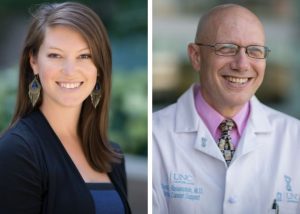
“How do you afford cancer treatment?” It’s a difficult question for many that UNC Lineberger’s Stephanie Wheeler, PhD, MPH, and Donald Rosenstein, MD, are investigating.
This year, the research team was awarded a four-year, more than $1.87 million grant from the National Cancer Institute to extend their ongoing research on the financial burden, or financial toxicity, related to cancer care.
The impact of financial toxicity is fueled by the direct costs associated with treatment, lost income or wages, the psychological burden associated with high-cost care, as well as potentially harmful behavioral strategies that patients might use to cope with costs, such as skipping treatment.
The team will use the NCI grant to connect rural cancer patients in Carteret, Dare, Jackson, Lenoir, and Nash counties with financial navigation support resources.
Read the full story: NCI grant to help patients navigate costs of cancer care
Potential treatment strategy uncovered for pancreatic cancer

Pancreatic cancer is one of the deadliest cancers, but researchers in the laboratories and clinics are focused on changing this. A key finding by UNC Lineberger scientists has led to a clinical trial studying a new treatment strategy.
Researchers have known that a mutation in the KRAS gene is a critical driver of pancreatic cancer, but treatments that directly target the mutated gene’s effects have remained elusive. Finding ways to cut off the energy source for this cancer is one of the major directions for pancreatic cancer research.
The UNC Lineberger team, led by Kirsten Bryant, PhD, and Channing Der, PhD, discovered a technique to make pancreatic cancer cells reliant on one energy source, and then starve them of it.
Read the full story: Potential treatment strategy uncovered for pancreatic cancer
Another breakthrough in pancreatic cancer research this year includes research classifying tumor types to help predict how cancer will respond to therapies. UNC Lineberger’s Jen Jen Yeh, MD, and Naim Rashid, PhD, reported findings for how two subtypes of pancreatic cancer respond to treatments differently.
Advancements toward cancer vaccines
This year, UNC Lineberger scientists developed a model for predicting what might make an effective cancer vaccine against a patient’s tumor. This finding could help overcome a significant obstacle in the development of personalized cancer vaccines.
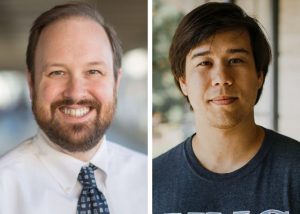
“One of the obstacles to cancer vaccine research is that you can have vaccine targets that aren’t able to generate a good response,” said Christof Smith, PhD, a student at the UNC School of Medicine. “To address this problem, we designed and validated a new machine-learning algorithm to predict for the ability of a particular, tumor-specific antigen to produce an immune response.”
Read the full story: Can scientists predict which cancer markers are likely to trigger an immune response?
“Generally, when we think of vaccines, we think in terms of disease prevention; you get a vaccine so your immune system can better recognize and fight off infections,” Smith said. “Cancer vaccines are different; we’re studying them to be used therapeutically.”
Specifically, the team is studying if they can take a tumor, identify potential targets that can activate immune responses, and design a personalized vaccine to develop the immune response to fight the tumor.
Read more about how UNC Lineberger cancer researchers are exploring ways to boost patient immune responses using targeted vaccines.
Major gift supports efforts in breast cancer research
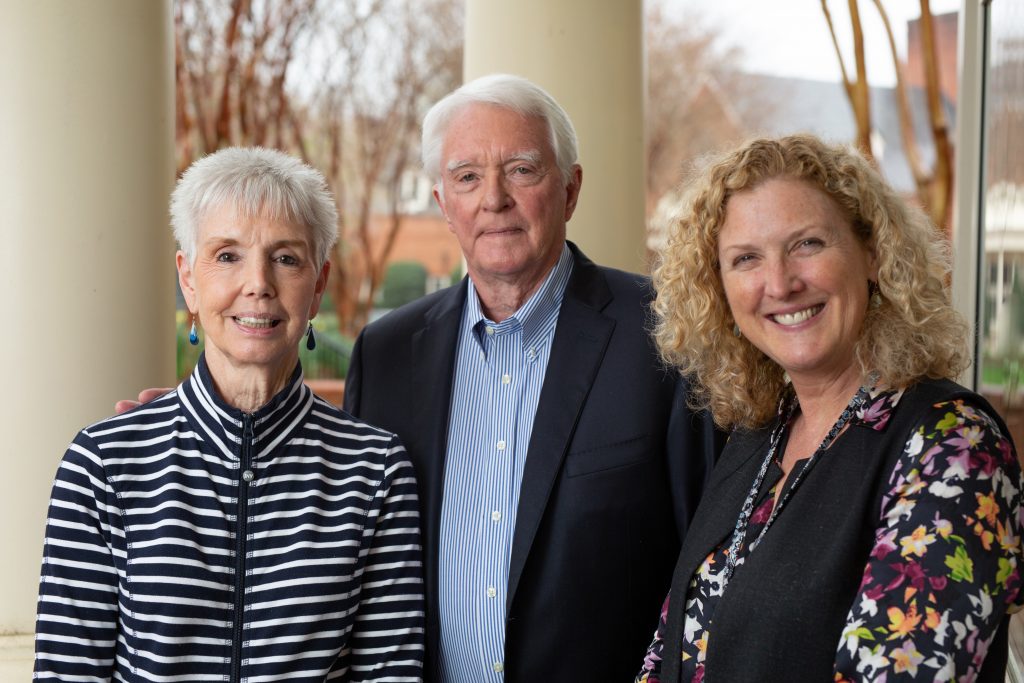
Bill and Nancy Graham of Winston-Salem, NC, donated $1 million to support breast cancer research and care at UNC Lineberger.
The Grahams established the BIll and Nancy Graham Breast Cancer Research Fund to provide the cancer center’s leadership with unrestricted funding, which enables them to make investments where the need is greatest, including faculty recruitment and research support.
“UNC Lineberger is one of the country’s leading cancer care and research centers, and we want to help ensure it has the resources to remain great,” Bill Graham said.
The Grahams view the gift as a way to ensure that everyone in North Carolina has access to the most advanced and best cancer care, regardless of where they live.
“We thought this was an important gift to make because UNC Lineberger is doing great work across the state, especially in our rural areas,” he added.
Read the full story: Major gift supports efforts in breast cancer research

Researchers identify cluster of N.C. counties with higher colorectal cancer death rates
UNC Lineberger researchers uncovered county-level factors linked to higher colorectal cancer mortality rates in a cluster of counties in northeastern North Carolina.
The study found that socioeconomic factors interact with several other risk factors in these areas, which shaped the higher rates of colorectal cancer death rates in these counties.
“That means when we try to do something to reduce cancer mortality in this target area, we need to think about all of these factors, and design multifaceted interventions,” said the study’s first author Tzy-Mey Kuo, PhD, research associate at UNC Lineberger.
Read the full story: Researchers identify cluster of N.C. counties with higher colorectal cancer death rates
Effects of vaping mirror same lung changes seen in smokers with emphysema
E-cigarette use, or vaping, is widely assumed to be safer than cigarette smoking and is used by many as a replacement for cigarettes.
However, researchers at UNC Lineberger have found evidence suggesting the vaping promotes the same cellular responses found in smokers with emphysema.
Read the full story: E-cigs can trigger same lung changes seen in smokers, emphysema
UNC Lineberger researchers have also studied the risks with youth and vaping. Studies over the past five years have shown a steady rise in vaping among youth. A 2019 study by the FDA showed that about 28 percent of U.S. youth are current e-cigarette users.
This year, Rebecca Williams, PhD, MHS, reported that cheap, disposable e-cigarettes could lower barrier to entry to vaping for young people.
A research team, including UNC Linebeger’s Adam Goldstein, MD, MPH, also reported that e-cigarette flavors decrease perception of harm among youth.
Tailoring treatment for HPV-linked head and neck cancer
Using a new blood test that’s in development, UNC Lineberger researchers identified characteristics that could be used to personalize treatment for patients with a type of head and neck cancer linked to human papillomavirus infection.
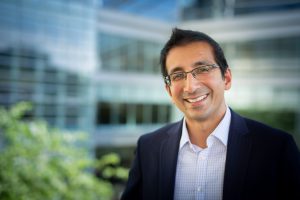
With the personalized treatment, they hope to tailor therapy for those patients to reduce their exposure to potential toxic side effects.
“There’s been a lot of interest in exploring whether we can give less treatment to these patients and still achieve the same level of cure, while reducing the toxicities of treatment,” said UNC Lineberger’s Gaorav Gupta, MD, PhD. “The goal of this study was to investigate whether a blood test for circulating tumor HPV DNA can potentially be used to monitor the response of a patient’s cancer to chemotherapy and radiation.”
Read the full story: Researchers identify traits linked to better outcomes in HPV-linked head and neck cancer
Also this year, UNC Lineberger’s Antonio Amelio, PhD, and colleagues used genetic insights to improve laboratory tools for studying HPV-linked head and neck cancer.
Lorelei rings the bell
| Seven-year-old Lorelei Partin celebrated completing her chemotherapy treatment for acute lymphoblastic leukemia by ringing the ceremonial bell in the N.C. Cancer Hospital’s Pediatric Hematology-Oncology Clinic.
Read the full story: A caring cancer community: mom and daughter support other pediatric patients |
